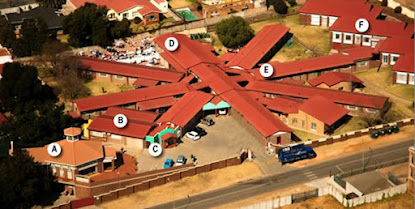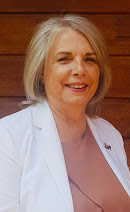Ulinda Lotz, a community activist in Riverlea will be talking to us about Zama Zamas, the name for people who mine illegally usually in closed mine shafts.
It's a huge problem, not only in Riverlea but here in Ekurhuleni and even in the Kruger National Park.
The main problem is battle between residents and Zama Zamas which often spins over into misogynistic attacks.
MANY people were killed in the fight between illegal miners at Makause squatter camp in Germiston, Ekurhuleni.
Police have been raiding illegal mining areas, arresting them and confiscating their equipment.
Residents said they were relieved that the police were finally cracking down on the nightmare of zama zamas in squatter camps and are hopeful this will finally bring peace to their kasi.
They said when the illegal miners fight, they are also affected.
A resident, Fanuel Sithole said: "We have a number of people who have died after being caught in crossfire in the squatter camp."
Another resident, Temogo Metsing said: "The worst was in 2021 when over seven innocent people were killed after being caught in the crossfire."
During the operation 14 phendukas, seven hammer crushers, four pot crushers, a wheelbarrow, a generator, seven municipal dustbins, five spades and shovels, three cooking pots, a 20-litre bucket full of grinding balls, three 2-litre bottles of vinegar and 58 units of various alcoholic beverages were found in an abandoned shack used by the illegal miners.
Last Week
The whole of our Projects meeting was taken up with Little Eden organised by John Anticevich. He had invited Xelda Rohrbeck, the CEO of Little Eden, to discuss ways that we could increase our support for the organisation. The result of the meeting was very encouraging. Watch this space for what we will consider in the future. It was decided that we would have a social meeting at the Little Eden Farm near Bapsfontein where we had already helped with the purchase of a new tractor which has meant they have been able to extend their plantation of pecan nut trees.
Club News
Our Club is the biggest Rotary contributor to the eradication of mice from Marion Island. Bigger than any of the coastal Rotary Clubs! This is such an important conservation project under the patronage of the current Duke of Edinburgh that we challenge other clubs to match or even exceed our contribution.
In July this year the Rotary Club of Knights Pendragon increased its sponsorship of the Mouse-Free Marion Project by a further 20 hectares to bring its total to 84, following its initial sponsorship of 10 hectares in 2022, increased in stages to 64 ha by May this year. The Club’s Executive Secretary, Jim Rankin, when sending in Proof of Payment for R20 000 writes: “Our Rotary Club, Knights Pendragon, has not been dragging its heels!”
Indeed it has not, as Jim Rankin explains quite how its welcome sponsorships have been raised: “My company (AGFACTS) administers an industry association, the Construction and Mining Equipment Suppliers’ Association (CONMESA). We had a Golf Day at the end of last year and we managed to twist some arms to donate to the Mouse-Free Marion Project via our Rotary Club”. He adds: “In our weekly Club meetings we have a brief “feel good” agenda item where anyone with something positive to say has his or her say and donates a sum of money to the Mouse-Free Marion Project. This brings in about R1 000 a month [equivalent to a one-hectare sponsorship] for the project. We have got to 84 hectares so far. My personal goal is that the Club sponsorships will get to 100 hectares by the time the project comes to fruition!”
On behalf of the whole MFM Team, Project Manager Anton Wolfaardt has expressed his pleasure with the continued support, writing back to Jim Rankin: “That’s fantastic news, thanks very much to you and the Rotary Club of Knights Pendragon. Your continued and generous support of the MFM Project is hugely appreciated.”
International
Rotary members work toward eliminating cervical cancer in Latin America
Bolivia has the highest rate of cervical cancer in South America, recording 1,985 new cases and 1,054 deaths in 2020. In the city of Santa Cruz alone, 90 women come to a hospital annually only to die of this preventable disease because of late diagnosis. Worldwide, 341,000 people die from cervical cancer each year, one every minute and a half. More often than not, they will be from a lower income country. Many will have left behind children and spouses who depended on them even as the cancer spread. Equally significant is the degree of suffering any terminally ill woman with the disease will experience as the condition advances toward its inevitable conclusion.
That's why we're dedicated to bringing the newest screening and treatment technologies to Bolivia, where doctors and nurses quickly learn how to employ them. Combining those human skills and medical innovations, we can screen upward of 600 patients in a day and treat early cancer in 40 seconds. Our goal is to test 7,500 patients, a project that may take three years to complete.
In 2022 we introduced an HPV genetic screening technology that allows women to test themselves at home. The majority of people will test negative and won't have to retest for at least three to five years. The testing is easier on the women because they don't have to travel to a hospital and on the clinicians, who only have to screen the patients in the hospital who do test positive. These quantum leaps in technology allow programs like the one we introduced in Guatemala and the one we've begun in Bolivia to move forward quickly. In September we will bring a similar program to Nepal — and in May, at the Rotary International Convention in Melbourne, Australia, it was announced that United to End Cervical Cancer in Egypt was the recipient of Rotary's third annual Programs of Scale award, which comes with a $2 million grant from The Rotary Foundation.

















